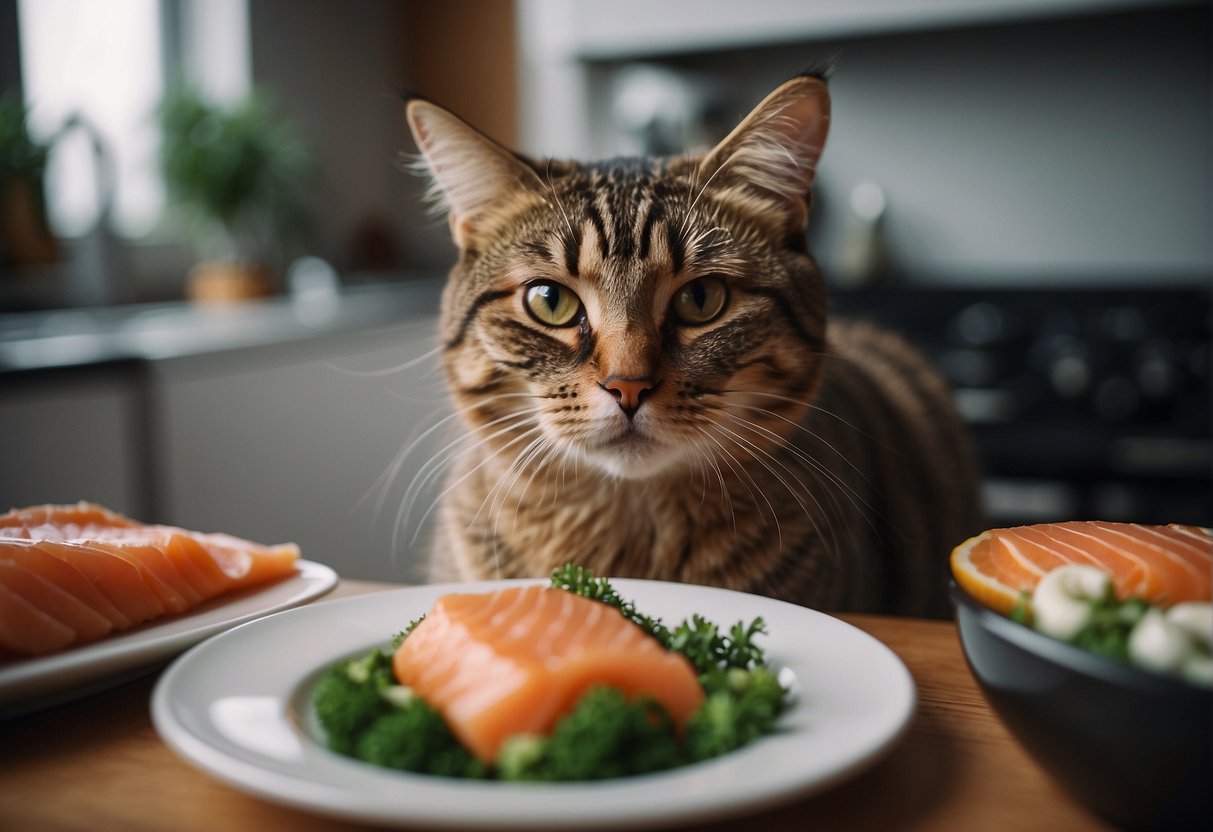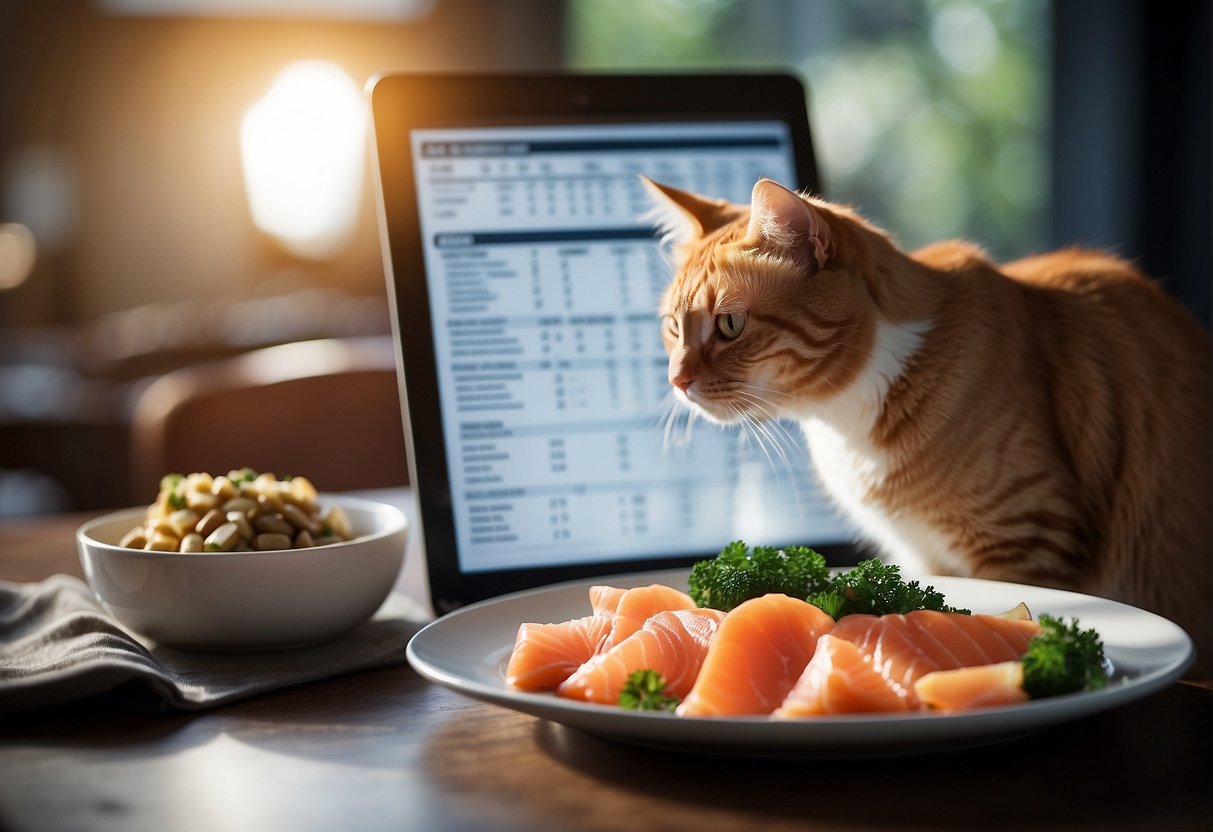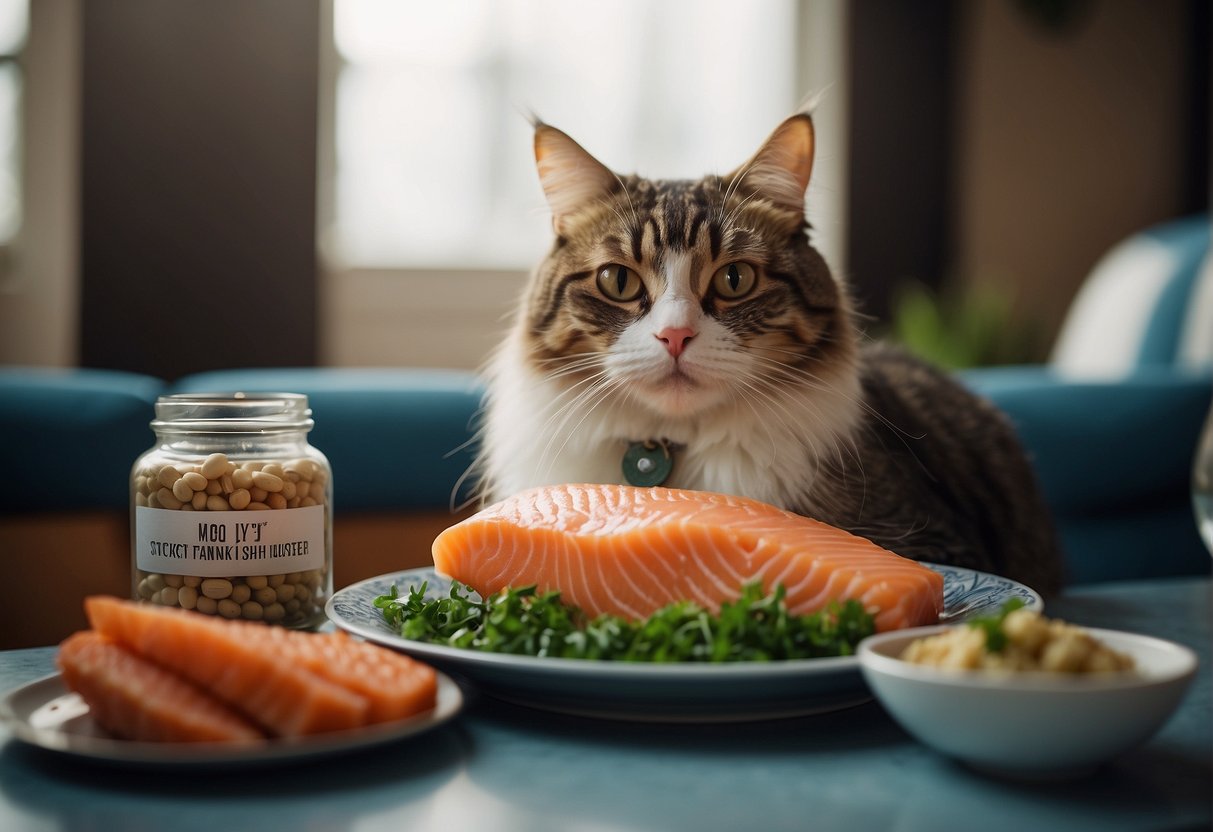As a cat owner, you’re probably familiar with those big, longing eyes that follow every bite you take—especially when it’s something as tantalizing as smoked salmon.
Smoked salmon is a popular fish delicacy for humans, known for its rich taste and nutritional benefits.
But can cats have smoked salmon?
Cats go crazy for this popular fish, but don’t give your furry pal a big chunk just yet.
Read on to find out why you shouldn’t give your cat too much salmon, as cats can’t digest its toxins very well, especially if they have a sensitive stomach.

Now let’s talk about whether smoked salmon is actually a good choice for your cat’s diet.
While cats are obligate carnivores by nature, and fish is often a favorite, smoked salmon is not the ideal food to add to their cat’s diet.
Despite being rich in protein and omega-3 fatty acids, smoked salmon can contain high levels of salt and potentially harmful bacteria. (1)
Cats, as obligate carnivores, need taurine, an essential amino acid, to prevent heart disease, and they can’t get this amino acid from plant sources like raw fish or plant protein supplements. (2)
Moderation is key, and there are certainly better alternatives to maintain a healthy cat’s diet and avoid harmful bacteria.
Key Takeaways
- Smoked salmon is not recommended as a main food source for cats.
- High sodium content and potential additives in smoked salmon can be harmful to cats.
- There are healthier fish and meat options to feed your cat that align with their dietary needs.
Comprehensive Guide to Feeding Smoked Salmon to Cats
You’ve probably noticed that your feline friend often tries to nab a bite of your smoked salmon.
It’s tempting to share, but there’s more to consider before offering a slice to your kitty.
Why Be Cautious?
While cats are carnivores and usually love fish, smoked salmon isn’t the best choice for them. The smoking process adds a lot of salt, and too much sodium is harmful to cats’ health.
Plus, the potential of heavy metals and other contaminants makes it a risky treat.
Know the Risks:
- Excess Salt: Can lead to sodium ion poisoning. (3)
- Additives: Spices and seasonings may be toxic to cats.
- Bacteria: Undercooked salmon risks bacterial contamination.
- Thiamine Deficiency: Smoking doesn’t always destroy enzymes that break down essential B vitamins. (4)
Moderation Is Key
If you still want to indulge your cat, moderation is crucial. Think of smoked salmon as a rare treat, not a regular part of their diet.
Safe Feeding Tips
- Thorough Cooking: Ensure it’s cooked to eliminate bacteria.
- Small Portions: A tiny bit avoids the hazards of overconsumption.
- Plain Variant: Opt for salmon without added spices or seasonings.
Alternatives
Why not try safer alternatives? Plain, cooked, unseasoned salmon or specially formulated cat food with fish is a healthier option.
By understanding the potential problems with smoked salmon, you can ensure your cat stays healthy and happy.
While smoked salmon might tempt you as a treat for your cat, turning to natural cat treats specifically designed for feline health can provide a safer alternative, ensuring your cat enjoys the benefits without the risks
Treats should be just that—a treat! So keep those salmon slivers scarce and share with care。
Detailed Nutritional Analysis of Smoked Salmon

You might find yourself wondering if that delicious smoked salmon, or lox, you’re nibbling on could be shared with your feline friend.
Let’s get into what’s really in this treat.
Smoked salmon, or lox, is teeming with protein and boasts a good dose of omega-3 fatty acids, which are fabulous for your cat’s joints and coat.
Yet, there’s a catch! When it comes to sodium, smoked salmon is a heavyweight champion, which might not be ideal for your kitty’s diet.
However, it’s important to note that smoked salmon also contains healthy fats, which have numerous health benefits for your cat’s health.
Here’s a quick peek at the numbers:
| Nutrient | Smoked Salmon | Typical Cat Food |
| Protein | High | High |
| Omega-3 Fatty Acids | High | Varies |
| Sodium (Na) | Much Higher | Lower |
| Preservatives (Nitrates) | Common | Less Common |
Now, let’s chat about why these numbers matter. Cats need only a tidbit of sodium in their diets, and the surging sodium levels in smoked salmon could march them straight toward sodium ion poisoning. (5)
Not the best news, right?
And those preservatives we breeze past on labels, such as nitrates? Well, they might just ruffle your cat’s digestive feathers, causing allergic reactions or gastrointestinal woes.
Here’s a real head-scratcher for you: In documented cases, cats have trotted into trouble after scarfing down smoked salmon.
Health issues reported include vomiting, diarrhea, and even more severe reactions related to the high sodium content.
So, while your intentions are pure, sharing this flavorful fish might be more trick than treat for your purring pal.
Keep the affection, ditch the salmon, and both you and your cat will be the better for it!
Expert Perspectives on Smoked Salmon for Cats
Have you ever caught your kitty eyeballing your smoked salmon and wondered if a little taste is okay? It’s a common curiosity among cat owners.
But before you share your snack, let’s see what vets say about this smoky fishy treat.
Veterinary Insights:
Veterinarians caution against making smoked salmon a regular part of your cat’s diet. Despite its appeal to feline taste buds, there are a few things to consider:
- Sodium Levels:
Smoked salmon is typically high in salt, which can be harmful to cats if consumed excessively. - Bacterial Risks:
There is a concern about bacterial contamination, especially if the salmon isn’t thoroughly cooked. - Nutritional Imbalance:
Cats require a balanced diet tailored to their carnivorous needs. Smoked salmon should not replace a complete cat food formulated to meet these needs.
Now, you might wonder about the positives. Smoked salmon is rich in Omega-3 fatty acids, which are great for your cat’s coat and skin health.
But here is a stat to chew on: the amount of Omega-3s in smoked salmon may not meet your cat’s daily requirements, and it shouldn’t be their primary protein source.
Cats need other important nutrients and vitamins in their diets as well, such as Vitamin A, Vitamin D, Vitamin B, calcium, magnesium, niacin, and other important nutrients that play crucial roles in your cat’s health.
Smoked salmon alone can’t provide everything your cat needs to thrive, so it should be part of a well-rounded diet, not their entire diet.
| Nutrient | Benefit for Cats | Concern in Smoked Salmon |
| Omega-3 Fatty Acids | Supports skin & coat health | May be insufficient |
| Sodium | Required in small amounts | Often too high in smoked salmon |
| Protein | Essential for growth & repair | Can be unbalanced in smoked salmon |
Remember, moderation is key. A small piece of smoked salmon as an occasional treat is probably okay. Just make sure you don’t let it replace their regular, nutritionally balanced meals.
So yes, your cat can technically nibble on that smoked salmon, but it’s not the easy answer or the purr-fect meal option.
Keep an eye on those portions, and your fuzzy friend will thank you for not giving them too much good things salmon!
Safe Dietary Practices and Alternatives

Curious if your feline friend can indulge in smoked salmon alongside you? Keep it rare—like their instincts!
Smoked salmon, while tempting, should be at most, an occasional treat due to its high sodium content. Not all that glitters in our meals is gold for our pets.
Recommended Serving Sizes and Frequency:
- Moderation is key:
If you decide to treat your cat to smoked salmon, think tiny—no more than a small bite-sized piece. - Frequency:
Limit this treat to perhaps once a month to prevent sodium overload.
Ever wondered about serving up something less salty but still fishy?
Here are some healthier alternatives that won’t have you fishing for compliments on responsible pet ownership:
- Cooked plain salmon: A healthier choice, sans salt and spices
- Whitefish: Often lower in fat than salmon
- Cat treats: Plenty are formulated with fish flavors and healthy additives
Why opt for less smoky alternatives?
They’re lower in sodium and won’t have the potential additives that smoked products carry.
Preparing a Safe, Homemade Salmon Treat:
- Choose a fresh salmon cut.
- Remove all bones—those pesky things can be dangerous.
- Cook it thoroughly—no seasonings, please.
- Cool and serve a small portion; refrigerate leftovers.
Remember, too much of any fish can lead to nutrient imbalances, so while you play chef, keep these healthy treats sporadic.
Your kitty’s diet should still revolve around a balanced, high-quality commercial cat food—think of it as the purr-fect foundation with the occasional fishy bonus!
Quick Recap

Thinking of sharing your smoked salmon with your furry friend?
Let’s fish out the facts and make sure you’re making the best choice for your cat’s health!
- Safety First:
Cats can technically consume smoked salmon, but it comes with caveats. The high sodium content and potential for harmful additives make it less ideal for your cat’s diet.
Plus, long cooking times don’t translate to benefits for your kitty. - Variation is Key:
While cats might love the taste, smoked salmon shouldn’t be a staple.
A little nibble here and there?
Sure, but it’s not a meal replacement. - Vet Knows Best:
Ever considered asking a vet before changing your cat’s menu?
Personalized advice might just be the catch of the day! - Balance it Out:
Cats need cat-specific nutrients and balanced meals to thrive. Steer clear of making smoked salmon a regular treat.
Remember, moderation and consultation are your anchors here.
Keep your cat’s diet anchored in what’s best for them, and when in doubt, chat with your vet for a tail-waggingly good diet plan!
Frequently Asked Questions
Curious whether your feline friend can join in on your love for smoked salmon?
Let’s navigate the ins and outs of feeding your cat this tasty treat.
Is Smoked Salmon Safe for Cats?
While you might be tempted to share your smoked salmon with your cat, it’s important to practice caution.
Smoked salmon isn’t toxic to cats, but it’s not the healthiest choice either.
The high salt content and potential preservatives that keep it delicious for you can be troublesome for your kitty.
Can Smoked Salmon Cause Health Issues in Cats?
Indeed, the salty snack can lead to health issues in felines. The main concerns are the high levels of salt which can cause sodium ion poisoning in large amounts.
Signs of discomfort or illness in your cat after eating smoked salmon require immediate veterinary attention.
How Much Smoked Salmon Can I Safely Feed My Cat?
The key here is moderation. If you do decide to treat your cat, a tiny amount on rare occasions might be okay.
However, smoked salmon should never replace regular cat food or become a significant part of their diet.
Are There Any Nutritional Benefits of Smoked Salmon for Cats?
Smoked salmon does contain omega-3 fatty acids, which are beneficial for your cat’s coat and joint health.
Nevertheless, the risks often outweigh the benefits when it comes to smoked salmon, making it a less-than-ideal source of nutrients for your pet.
What Are the Symptoms of Sodium Ion Poisoning in Cats?
If your cat consumes too much salt, watch out for symptoms like vomiting, diarrhea, decreased appetite, lethargy, incoordination, excessive thirst or urination, and potential tremors or seizures.
If you notice any of these signs, it’s a trip to the vet’s office, pronto!
Can Kittens Have Smoked Salmon?
Kittens are particularly sensitive to foods that aren’t part of their regular diet.
Their developing bodies can react negatively to the high salt content and additives in smoked salmon.
It’s best to stick to kitten-formulated food to ensure they grow up healthy and strong.
- Where to find the most trustworthy real money casinos - August 7, 2025
- Online Casinos That Approve PayPal: The Ultimate Overview - August 7, 2025

